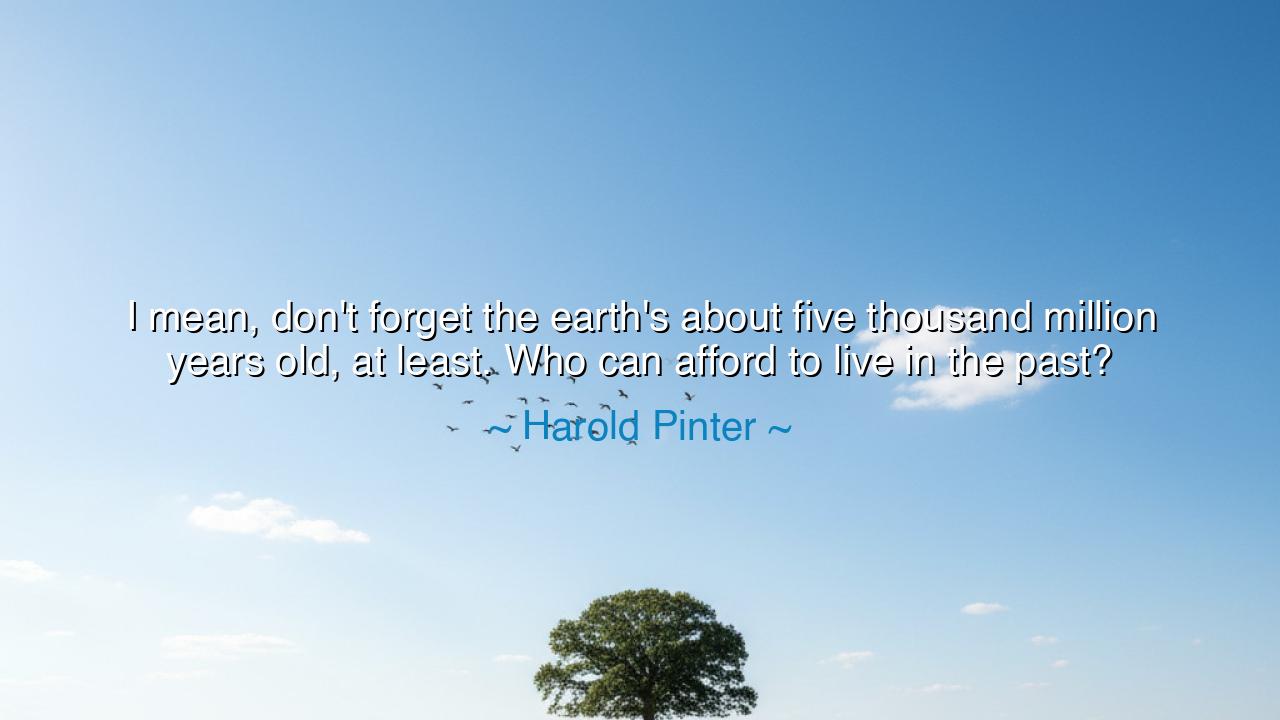
I mean, don't forget the earth's about five thousand million
I mean, don't forget the earth's about five thousand million years old, at least. Who can afford to live in the past?






Hear the words of Harold Pinter, playwright of shadows and silences, who spoke with a perspective as vast as the ages: “I mean, don’t forget the earth’s about five thousand million years old, at least. Who can afford to live in the past?” In this utterance lies a rebuke to the human tendency to cling to what has been. Against the backdrop of eternity, our regrets, our nostalgic longings, even our cherished memories, are but fleeting sparks. To live only in the past is to deny the immensity of life that stretches before us, as ancient as stone and as ever-renewing as the dawn.
The earth, older than empires, older than memory, has endured cataclysm, fire, flood, and ice. Kingdoms have risen and crumbled to dust while the planet continued its turning. In such vastness, the notion of remaining chained to yesterday seems not only unwise, but absurd. Pinter’s words remind us that our lives are small threads woven into a cosmic tapestry of billions of years. The past is real, yes—but to dwell in it is to ignore the immensity of the present and the promise of the future.
The ancients, too, grasped this truth. Heraclitus, the philosopher of flux, declared, “You cannot step into the same river twice.” He knew that time itself is a river, ever moving, ever new. To cling to the past is to resist the river’s current, to exhaust oneself against the inevitable flow. Pinter speaks in the same spirit: who can afford such resistance, when life demands forward motion? The earth will not wait for us to brood over yesterday; it moves, and we must move with it.
History gives us luminous examples. After the fall of Rome, much of Europe mourned the grandeur that was lost. Some longed to cling to the shadows of empire. Yet those who dared to look forward laid the foundations of new nations, new cultures, and new philosophies that shaped the modern world. Had all humanity lived in the past, worshiping the ashes of what was, the fire of progress would never have been kindled. It is always the courage to release yesterday that allows tomorrow to be born.
Even in personal lives this lesson resounds. Consider Nelson Mandela, who emerged from twenty-seven years of imprisonment. He could have lived forever in the bitterness of his past. Yet he chose another way: to step forward into reconciliation, to build a future rather than curse the years already lost. His life became proof of Pinter’s insight—that though the past is heavy, to live within it is a greater loss than any injustice already endured.
What lesson, then, must you take? Do not squander your brief years upon the altar of yesterday. The earth has endured for five thousand million years, and your time upon it is but a breath. To spend that breath reliving the past is to waste the only gift you possess: the present. Let memory be a teacher, not a prison. Let the past be a root, not a chain. The tree grows upward because it does not cling forever to the seed.
Practical steps are clear: when your mind drifts too often to regrets or to longing for what has been, remind yourself of the vastness of existence. Go outside and look upon the sky, the mountains, the sea—witness how the earth has moved forward without ceasing. Practice gratitude each morning for the day at hand, not the days already gone. And when sorrow tempts you to dwell on what you cannot change, ask yourself: “Can I afford to live in the past?”
Thus remember Pinter’s wisdom: life is far older and larger than our yesterdays. The past is a page already written; the present is the ink in your hand. Do not waste your breath on what has gone, but rise, and write the lines that are yet to come. For to live in the past is to be buried alive—but to embrace the present is to walk with the eternal turning of the earth itself.






AAdministratorAdministrator
Welcome, honored guests. Please leave a comment, we will respond soon